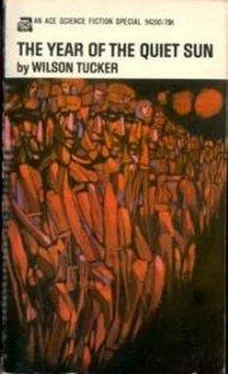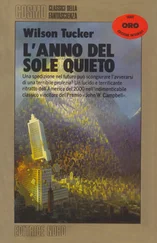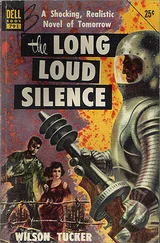“Yes, sir, that is correct, but the nuclear reactor has been operating for more than two years. The previous lower limit of the TDV was December 30, 1941, but now that may have to be drastically revised. If it is found that the vehicle may not operate prior to the establishment of its power source, the lower limit will be brought forward to an arbitrary date of two years ago. We do not wish to lose the vehicle.”
Chaney said: “One of those bright engineers should sit down to his homework — lay out a paradox graph, or map, or whatever. Katrina, if you keep this thing going, you’re going to find yourself up against a wall sooner or later.”
She colored and betrayed a minute hesitation before answering him. “The Indiana Corporation has been approached on the matter, sir. Mr. Seabrooke has proposed that all our data be turned over to them for a crash study. The engineers are becoming aware of the problems.”
Saltus looked around at Chaney and said: “Sheeg!”
Chaney grinned and thought to offer an apology to Moresby and the woman. “That’s an old Aramaic word. But it expresses my feelings quite adequately.” He considered the matter. “I can’t decide what I would rather do: stay here and make paradoxes, or go back there and solve them.”
Saltus said: “Tough luck, civilian. I was almost ready to volunteer. Almost , I said. I think I’d like to stand on the city wall at Larsa with you and watch the Euphrates flood; I think I’d like — What?”
“The city wall at Ur, not Larsa.”
“Well, wherever it was. A flood, anyway, and you said it got into the Bible. You have a smooth line, you could persuade me to go along.” An empty gesture. “But I guess that’s all washed out now — you’ll never go back.”
“I don’t believe the White House would authorize a probe back that far,” Chaney answered. “They would see no political advantage to it, no profit to themselves.”
Major Moresby said sharply: “Chaney, you. sound like a fool!”
“Perhaps. But if we could probe backward I’d be willing to lay you money on certain political targets, but nothing at all on others. What would the map of Europe be like if Attila had been strangled in his crib?”
“Chaney, after all!”
He persisted. “What would the map of Europe be like if Lenin had been executed for the anti-Czarist plot, instead of his older brother? What would the map of the United States be like if George the Third had been cured of his dementia? If Robert E. Lee had died in infancy?”
“Civilian, they sure as hell won’t let you go back anywhere with notions like that.”
Dryly: “I wouldn’t expect a bonus for them.”
“Well, I guess not!”
Kathryn van Hise stepped into the breach.
“Please, gentlemen. Appointments have been made for your final physical examinations. I will call the doctor and inform him you are coming now.
Chaney grinned and snapped his fingers. “ Now .”
She turned. “Mr. Chaney, if you will stay behind for a moment I would like more information on your field data.”
Saltus was quickly curious. “Hey — what’s this?” She paged through the pile of mimeographed papers until she found the transcript of Chaney’s tape recording. “Some parts of this report need further evaluation. If you care to dictate, Mr. Chaney, I will take it in shorthand.”
He said: “Anything you need.”
“Thank you.” A half turn to the others at the table. “The doctor will be waiting, gentlemen.”
Moresby and Saltus pushed back their chairs. Saltus shot Chaney a warning glance, reminding him of a promise. The reminder was answered with a confirming nod.
The men left the briefing room.
Brian Chaney looked across the table at Katrina in the silence they left behind. She waited quietly, her fingers laced together on the table top.
He remembered her bare feet in the sand, the snug delta pants, the see-through blouse, the book she carried in her hand and the disapproving expression she wore on her face. He remembered the startlingly brief swim suit worn in the pool, and the way Arthur Saltus had monopolized her.
“That was rather transparent, Katrina.”
She studied him longer, not yet ready to speak. He waited for her to offer the next word, holding in his mind the image of that first glimpse of her on the beach.
At length: “What happened up there, Brian?”
He blinked at the use of his given name. It was the first time she had used it.
“Many, many things — I think we covered it all in our reports.”
Again: “What happened up there, Brian?”
He shook his head. “Seabrooke will have to be satisfied with the reports.”
“This is not Mr. Seabrooke’s matter.”
Warily: “I don’t know what else I can tell you.”
“Something happened up there. I am aware of a departure from the norm that prevailed before the trials, and I think you are too. Something has created a disparity, a subtle disharmony which is rather difficult to define.”
“The Chicago wall, I suppose. And the JCS revolt.”
“They were shocks to us all, but what else?”
Chaney gestured, searching for an escape route. “I found the barracks closed, locked. I think the Major and myself have left the station.”
“But not Commander Saltus.”
“He may be gone — I don’t know.”
“You don’t seem very sure of that.”
“I’m not sure of anything. We were forbidden to open doors, look at people, ask questions. I didn’t open doors. I know only that our barracks have been closed — and I don’t think Seabrooke let us move in with him.”
“What would you have done if it was permissible to open doors?”
Chaney grinned. “I’d go looking for you.”
“You believe I was on the station?”
“Certainly! You wrote notes to each of us — you left final instructions for us in the room downstairs. I knew your handwriting.”
Hesitation. “Did you find similar evidence of anyone else being on station?”
Carefully: “No. Your note was the only scrap.”
“Why has the Commander’s attitude changed?”
Chaney stared at her, almost trapped. “Has it?”
“I think you are aware of the difference.”
“Maybe. Everybody looks at me in a new light. I’m feeling paranoiac these days.”
“Why has your attitude changed?”
“Oh? Mine too?”
“You are fencing with me, Brian.”
“I’ve told you everything I can tell you, Katrina.”
Her laced fingers moved restlessly on the tabletop. “I sense certain mental reservations.”
“Sharp girl.”
“Was there some — some personal tragedy up there? Involving any one of you?”
Promptly: “No.” He smiled at the woman across the table to rob his next words of any sting. “And, Katrina — if you are wise, if you are very wise, you won’t ask any more questions. I hold certain mental reservations; I will evade certain questions. Why not stop now?”
She looked at him, frustrated and baffled.
He said: “When this survey is completed I want to leave. I’ll do whatever is necessary to complete the work when we return from the probe, but then I’m finished. I’d like to go back to Indic, if that’s possible; I’d like to work on the new paradox study, if that’s permissible, but I don’t want to stay here. I’m finished here, Katrina.”
Quickly: “Is it because of something you found up there? Has something turned you away, Brian?”
“Ah — No more questions.”
“But you leave me so unsatisfied!”
Chaney stood up and fitted the empty chair to the table. “Every thing comes to every man, if he but has the years. That sounds like Talleyrand, but I’m not sure. You have the years, Katrina. Live through just two more of them and you’ll know the answers to all your questions. I wish you luck, and I’ll think of you often in the tank — if they’ll let me back in.”
Читать дальше












